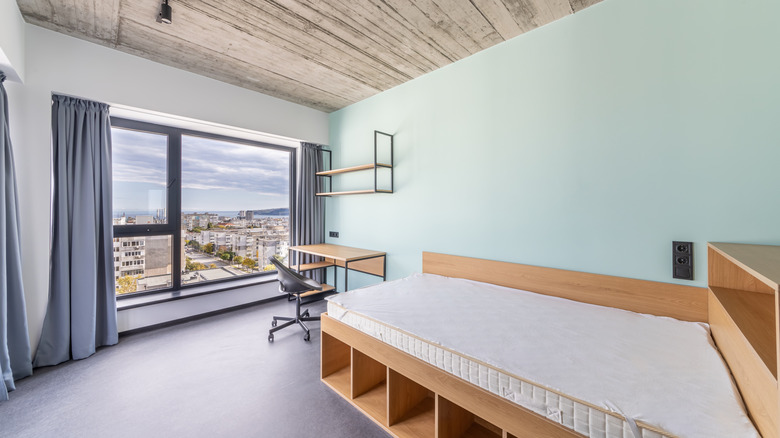The Wildly Affordable Trick To Make A College Campus The Base For Your Next Vacation, Per Samantha Brown
Rick Steves has some amazing advice for finding budget-friendly travel accommodation, but his fellow travel expert Samantha Brown has dropped a savvy idea of her own for saving money while traveling — and it's so darn good we couldn't not share it. The tip, mentioned in an Instagram post and originally shared by user @mamceuen, suggests finding more affordable travel accommodations on university campuses. "When not in term, they often rent out dorms and include [a] dining hall for breakfast," says the post. This can be a great way to snag accommodation in the heart of the action, since many city universities are located near the busiest neighborhoods. It's a quirky and affordable alternative to hotels in high-priced destinations.
To be clear, summer dorm stays aren't just for students — many universities in America and Europe offer them to travelers of all ages. But some people are so determined to make the most of hostels that they completely overlook this convenient and affordable lodging option. These dorms are typically available outside the school's devoted calendar year, for example during summer, winter, and spring breaks. It's a great way as an adult to experience the nostalgia of a college setting or a uniquely historic stay: Embrace James Joyce fantasies in Trinity College's heritage accommodations, or book a night for the whole family in Porzellaneum, Vienna's oldest continuously operating student residence.
As mentioned in Brown's post, some residence halls will even include breakfast or full board in their rates, served at the on-site dining hall or restaurant. You'll often have access to the universities' free amenities such as Wi-Fi, public gardens, and historic facilities, like the cloisters and chapels of Cambridge. Some even offer long-term solutions for those looking to stay in one place for more than a month without the hassle of renting an apartment.
Why a college campus stay makes a great vacation base
If your main focus on vacation is sightseeing, you'll likely be spending minimal time in your room, so why splurge on something fancy? Dorms, like hostels, often cost a fraction of what traditional hotels do, sometimes priced at less than $75 per night, allowing you to stretch your travel dollars. Some colleges only offer long-term rentals, which can be great if you plan to stay in one place for several weeks, but many do provide nightly housing, especially through platforms like UniversityRooms.com. The site is like the Booking.com of dorm stays, and while the majority of its network is based in the U.K., it has offerings across Europe, North America, and Australia, as of this publication.
Most short-term stays provide linens and towels (though you should always check to make sure this is the case) with access to shared kitchens, laundry facilities, and common spaces. And since schools are often located in walkable neighborhoods with public transit access, they're easy launch pads for exploring city museums, cafes, and parks. For example, you can spend summer downtown in the "Capital of Free Museums" at Washington, D.C.'s George Washington University for as little as $289 per week. Or have your own apartment-style Unihabit suite in Barcelona, moments from La Rambla, for roughly $130 per night (prices subject to change). Check housing department websites for schools in the city you plan to visit to see what options they might have available.
Do keep in mind that most university residences provide minimalistic furniture, and sometimes bathrooms are shared, for a full whiff of that no-frills, "back-to-school" vibe. Because of this, the dorm option works best for solo travelers, budget-conscious families, and nostalgic travelers who love a university setting.

